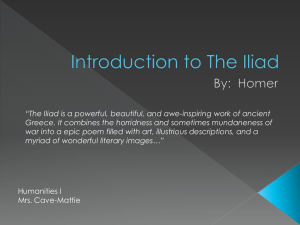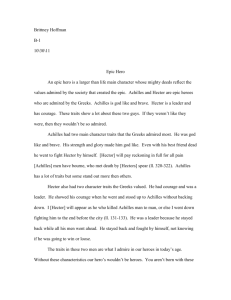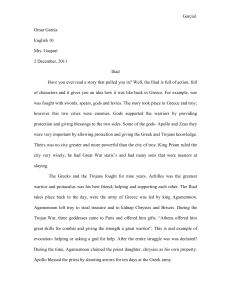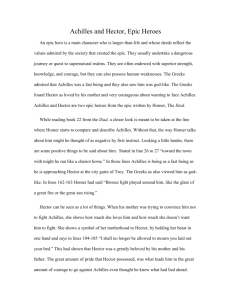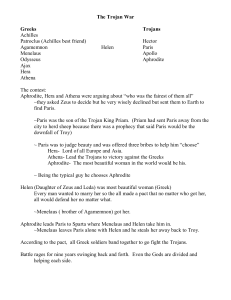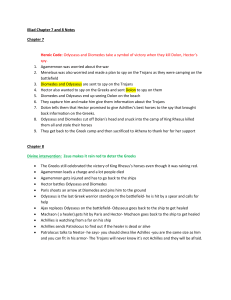Iliad Plot Summary: Books 1-10 | Key Events & Characters
advertisement
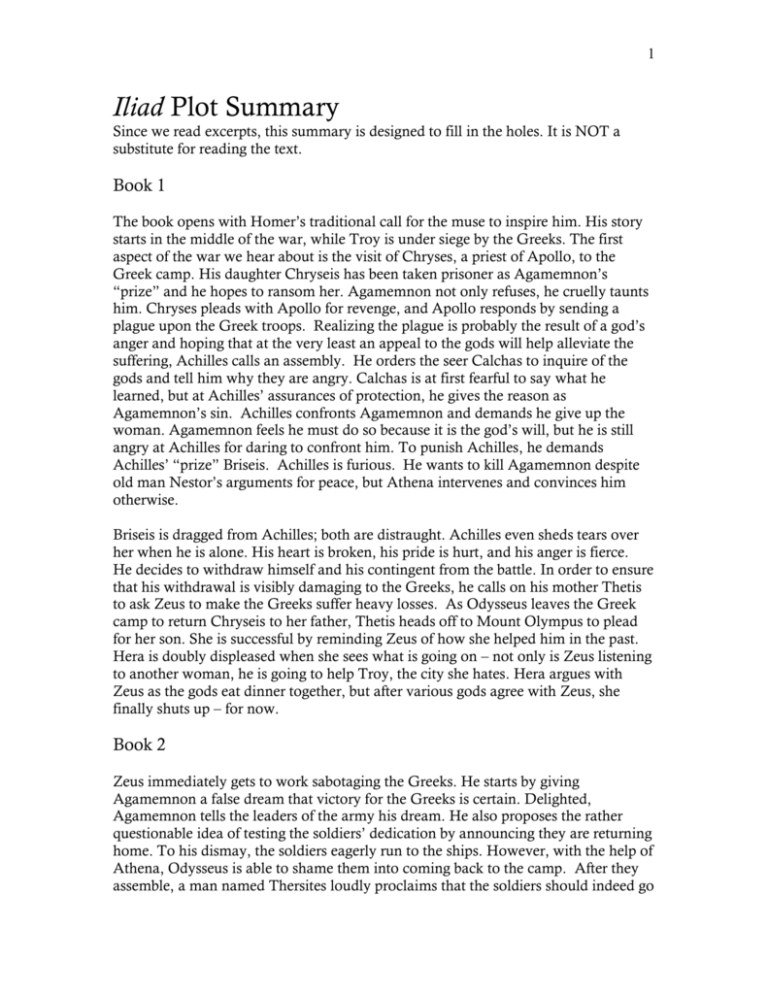
1 Iliad Plot Summary Since we read excerpts, this summary is designed to fill in the holes. It is NOT a substitute for reading the text. Book 1 The book opens with Homer’s traditional call for the muse to inspire him. His story starts in the middle of the war, while Troy is under siege by the Greeks. The first aspect of the war we hear about is the visit of Chryses, a priest of Apollo, to the Greek camp. His daughter Chryseis has been taken prisoner as Agamemnon’s “prize” and he hopes to ransom her. Agamemnon not only refuses, he cruelly taunts him. Chryses pleads with Apollo for revenge, and Apollo responds by sending a plague upon the Greek troops. Realizing the plague is probably the result of a god’s anger and hoping that at the very least an appeal to the gods will help alleviate the suffering, Achilles calls an assembly. He orders the seer Calchas to inquire of the gods and tell him why they are angry. Calchas is at first fearful to say what he learned, but at Achilles’ assurances of protection, he gives the reason as Agamemnon’s sin. Achilles confronts Agamemnon and demands he give up the woman. Agamemnon feels he must do so because it is the god’s will, but he is still angry at Achilles for daring to confront him. To punish Achilles, he demands Achilles’ “prize” Briseis. Achilles is furious. He wants to kill Agamemnon despite old man Nestor’s arguments for peace, but Athena intervenes and convinces him otherwise. Briseis is dragged from Achilles; both are distraught. Achilles even sheds tears over her when he is alone. His heart is broken, his pride is hurt, and his anger is fierce. He decides to withdraw himself and his contingent from the battle. In order to ensure that his withdrawal is visibly damaging to the Greeks, he calls on his mother Thetis to ask Zeus to make the Greeks suffer heavy losses. As Odysseus leaves the Greek camp to return Chryseis to her father, Thetis heads off to Mount Olympus to plead for her son. She is successful by reminding Zeus of how she helped him in the past. Hera is doubly displeased when she sees what is going on – not only is Zeus listening to another woman, he is going to help Troy, the city she hates. Hera argues with Zeus as the gods eat dinner together, but after various gods agree with Zeus, she finally shuts up – for now. Book 2 Zeus immediately gets to work sabotaging the Greeks. He starts by giving Agamemnon a false dream that victory for the Greeks is certain. Delighted, Agamemnon tells the leaders of the army his dream. He also proposes the rather questionable idea of testing the soldiers’ dedication by announcing they are returning home. To his dismay, the soldiers eagerly run to the ships. However, with the help of Athena, Odysseus is able to shame them into coming back to the camp. After they assemble, a man named Thersites loudly proclaims that the soldiers should indeed go 2 home because Agamemnon is using them for nothing more than to increase his own glory. Odysseus reminds the Greeks that the gods have promised victory. Nestor chimes in to remind the troops that they must be truth to their oaths and retrieve Helen. After the troops have been re-assembled for battle, Homer lists all of them, troop by troop, in what is known as the “Catalog of the Ships.” He does the same for the troops of Troy as they come out to meet the Greeks in battle. Book 3 Paris reappears to challenge any Greek to a duel. He says that Helen will go to the winner. When Helen’s ex Menelaus happily volunteers to fight, Paris realizes he is overmatched and takes off running. Hector has to chase him down and he and his father Priam shame Paris into returning. After a visit from the goddess Iris filling her in one what is going on, Helen goes to Priam to watch the duel from the walls. After Priam reassures her that this war is not really her fault, Helen points out the most famous of the Greek soldiers. She notes that Achilles is not among them. After she is done, Priam goes down to the battlefield in order to swear an oath to keep the terms of the contest. The fight begins. Paris is quickly wounded and taken prisoner (unsurprising considering he is not exactly known for his battle skills). Aphrodite helps out Paris by spiriting him away to his bedroom – a fitting place for loverboy, but everyone else is disgusted. Even Helen is reluctant to respond to Aphrodite’s call to join Paris in the bedroom. When Aphrodite threatens to take away Helen’s beauty, though, she changes her mind and obeys. That does not mean she is pleased with Paris. In the bedroom, she condemns him for being such a coward and challenges him to go back and fight a real duel with Menelaus. Still, Paris is quite sexy, and is able with Aphrodite’s help to get Helen to forget her anger long enough to have sex with him. Meanwhile, on the battlefield, the Greeks obviously want their prize. No one can claim Paris won that duel. If the Trojans keep to the terms and surrender Helen, the war will be over. Book 4 Watching from above, Zeus notes this incident might very well end the war and spare Troy. Of course, Hera and Athena do not like the sound of that. Hera proclaims that she does not just want the Greeks to win, she wants Troy decimated. Zeus agrees to let her have her way, but only after extracting a promise that she will not interfere if he ever wants to destroy a city she loves. Too vindictive to see the danger in such a promise, Hera agrees. Athena is sent off to break to truce; she does so by getting one of the Trojans, Pandaros, to shoot an arrow at Menelaus. It works – Menelaus is wounded (slightly) and the outraged troops, at Agamemnon’s urging, being the fighting again. Book 5 This book deals with Diomedes. He is the youngest of the famous Greek warriors, but he is powerful, brave, and wise – slow to anger, he takes it with a grain of salt 3 when the blustering Agamemnon yells at him. This book recounts Diomedes’ valor in battle as he takes down Trojan after Trojan. When he attacks the famous solider Aeneas and starts beating him, Aeneas’ mother Aphrodite arrives to help. Diomedes wounds her in the hand, causing her to drop her son and run off to Mount Olympus to protest her treatment at his hands (he had been allowed by Athena to attack Aphrodite). When Apollo goes to help Aeneas, carrying him away from the battle, Diomedes goes after him as well. Apollo simply blinds him with light whenever he gets close. Realizing he does not stand much of a chance, Diomedes backs off. He does the same when he realizes Ares, the war god, is fighting alongside Hector. Athena and Hera see what is happening and enter the fray. Athena helps Diomedes injure Ares, who takes off back for Mount Olympus to whine to Zeus. Zeus gives him no pity. Without Ares’ help, the Trojans are driven back. Athena and Hera also return to Mount Olympus. Book 6 As the battle wears on, Nestor and Hector attempt to encourage their respective forces. Some one-on-one conflicts occur within the larger battle. The Greeks gain ground. Hector goes back to Troy in order to ask the women of the city to plead the case of the Trojans to Athena. He hopes desperately that Athena will stop aiding the Greeks. He also stops by Helen and Paris’ room and excoriates Paris for running from the battle. Paris now spends all his time with Helen, making love and being lazy. Helen, anguished at what her life has become, curses herself for being the impetus to this war. Before leaving for battle, Hector returns to say goodbye to his wife, Andromache, and their baby Astyanax. Andromache pleads for him to say, but he explains that it is his duty to fight despite his love for his family. He takes his baby into his arms and, after holding him a little while longer, says his goodbyes. Book 7 Athena and Apollo agree that the war must be ended, and through a Trojan see, they advice Hector to attempt another truce by duel. Aias is chosen to represent the Greeks, but neither can win. Finally, night falls and the fighting stops. A temporary truce is called so that the dead, currently strewn across the battlefield, can be buried with funeral rites. The Greeks also take the opportunity to strengthen their position and fortify their camp by building a wall to protect the beach. Poseidon sees this and complains to Zeus that the Greeks should have sacrificed to him first. They determine that the walls will be knocked down once the war is over. Book 8 The next day, the two sides resume fighting. This time, at the command of Zeus, the gods are not a part of the action. Without the help of the gods, the Greeks lose ground. Seeing this, Hera decides to help out anyway. She gets Agamemnon to sacrifice to Zeus. Pleased, Zeus nods that he will give the Greeks a break. That does not mean that he no longer cares if the gods intervene. When Athena also attempts 4 to join the battle, he sends his messenger to them to warn them to stay out of it. Once they return to Mount Olympus, Zeus lectures them on their disobedience. They agree to behave – at least for the time being. Meanwhile, Hector decides to try a risky move in order to end the war. The Trojans camp outside of their famous walls and prepare to make their most powerful charge yet. Book 9 While Hector is making his plans with the Trojans, the Greek leaders also meet. Agamemnon, who had been so full of himself before, now wants to go home after their defeat that day by the Trojans. Wise Nestor and the bold Diomedes manage to convince him and the troops to stay. Nestor also persuades Agamemnon to give back Briseis in addition to other gifts in order to get Achilles to return and fight for them. He agrees and sends emissaries to Achilles, but the resentful Achilles refuses their offer. He does not even listen when his old mentor, Phoenix, attempts to persuade him. After learning of Achilles’ refusal, Diomedes encourages the Greeks to fight well regardless. Book 10 In order to make it easier to get an advantage, the Greeks decide to send spies to the Trojan camp – Diomedes and Odysseus. On their way, they meet up with a Trojan spy named Dolon who had been sent to do a little espionage as well. He is a coward. Cringing and begging for mercy, he tells them what they want to know. They kill him anyway. They do not stop there, however. Before heading back to their camp, they sneak into Rheseus’ tent and kill him along with twelve of his men. They also steal his horses, fulfilling a prophesy that the Greeks could not win until they had the horses of Rheseus. Book 11 The battle begins the next morning. At first, things look good for the Greeks. Agamemnon comes out fighting and leaves a trail of bodies in his wake. Then, Agamemnon is wounded, Hector re-enters the battle, and it starts to go badly for the Greeks. Some of their most famous soldiers get wounded – Odysseus and Diomedes, for example – and they have to retreat for a while. Achilles is watching from afar and asks Patroclus to descend to the battle to see who is wounded. While he is down on the field, Nestor talks to him. He begs him to convince Achilles to help the Greeks once more, and encourages Patroclus to help out even if Achilles refuses. Book 12 The battle continues. The Trojans push hard to destroy the wall of the Greek camp, but it holds. Despite this, Hector pushes on, fighting practically in a frenzy. Finally, he is advised to try to storm the walls on foot. He does so, followed by five battalions – one of which is lead by the erstwhile Paris. One general, Asius, refuses to get off of 5 his chariot and is promptly killed. Zeus helps Hector so that he and his troops are able to gain ground, but the Greek archers return fire effectively. Despite this, Hector manages to breach the Greek fortifications. Zeus sends an omen – a bird is flying through the air with a snake, but must drop it when it fights back. The Trojan seer Polydamas tells Hector it means the Trojans will win the battle but the Greeks will win the war. Hector does not listen. He is positive it means victory for the Trojans and calls Polydamas a coward. Finally, the Trojans are able to storm the Greek camp. They are able to drive the Greeks back to their ships. Book 13 The Greeks make a comeback with the help of Poseidon, but the Trojans refuse to retreat as Hector works to keep their courage up. Even Paris is fighting bravely. However, when the Trojans begin to suffer losses, Hector once again berates Paris for being the cause of the war. He goes back into battle and comes across the Greek Aias, who tells him that he has seen an omen that the Greeks will win. Hector insults him and promises to kill him once the Trojans have won. Book 14 Still, the Greeks are not out of danger. Nestor comes down to check on the battle and is appalled by the carnage. He meets up with Agamemnon, who again is wailing that they should go back to Greece. Zeus intends to help the Trojans; however, Hera seduces him with the help of Aphrodite in order to distract him, then gets the god of sleep to put him under afterwards. Poseidon takes the opportunity to help the Greeks, and they gain back ground. Hector is wounded. Book 15 Zeus wakes up, notices what is going on, and is angered by Hera’s tricks. She is apologetic and he forgives her. He then tells her that he had only been helping the Trojans because Achilles had asked him to do so in order to make Agamemnon pay for insulting him. However, he reveals that Achilles will soon re-enter the battle on the Greek side because his friend Patroclus will be killed by Hector. The gods are once again admonished to stay out of the battle, but Apollo is allowed to help Hector recover and encourage him to keep fighting. The Trojans advance and push the Greeks back to the ships once more, even setting fire to some of them. Book 16 Despite his anger, Achilles can’t help but feel bad for the Greeks as he watches the ships burn. Still, he refuses to join the battle. In spite of this, Patroclus decides to reenter the battle on the side of the Greeks. He convinces Achilles to let him wear his armor, knowing it will give courage to the Greeks if they think that Achilles has joined them. It works. The Greeks see Patroclus, think he is Achilles, and make another comeback. Patroclus even kills the son of Zeus, Sarpedon. Sarpedon begs 6 his fellow warrior Glaucus to ensure that his armor will not be stripped from his body. Glaucus calls Hector and the Trojans rally to protect the body of Sarpedon and push the Greeks back. The advance is only temporary, however. Now helping the Greeks, Zeus intervenes and the Trojans are forced to retreat. Patroclus chases them, despite Achilles’ earlier warning that he not do so. Apollo then goes into action to sabotage Patroclus and enable Hector to kill him. He zaps off Achilles’ armor and Patroclus is naked to attack. Hector kills him, but the dying Patroclus mocks the fact that Hector only was able to kill him with direct intervention from a god. Book 17 Once Patroclus has been killed, the two armies fight over who can claim his corpse and armor of Achilles. In the midst of the fighting, Hector grabs the armor and puts it on himself. As soon as the Trojans begin to push forward, however, Zeus and Athena help the Greeks repel them. Zeus does not want to help them too much, however. After the Greeks push forward, Zeus makes a mist descend in order to give the Trojans time to regroup and push ahead once more. To end the stalemate, Ajax sends word to Achilles that his friend is dead. Then, in a last rush, the Greeks are able to reclaim Patroclus’ body. Book 18 Once Achilles hears about Patroclus’ death, he is beside himself. Thetis comforts him. Now, he has a blood lust for the Trojans, especially Hector. He is itching to return to the battlefield. Thetis protests that he cannot go back because he has no armor, but she tells him she can get some from the smithy god Hephaistos. Ignoring her, Achilles arrives at the battlefield, screaming a battle cry enhanced by Athena. The Trojans are unnerved and fall back. The Trojan leaders meet on the battlefield to discuss this new and disturbing development. Hector refuses to retreat. Book 19 That night, Achilles mourns his friend. He also gets the special armor. Now that he is back, he announces that he and Agamemnon’s quarrel will no longer keep him from fighting. Eager to make up, Agamemnon says their argument was the fault of the gods and returns Briseis as well as giving Achilles other treasures. The Greeks all mourn Patroclus. Achilles must be nourished by the gods because he is too upset to eat. Even though the gods sustain him, his death is foretold in a prophesy (straight from the horses’ mouth – literally. They talk to him). It is coming soon. Book 20 Zeus tells the gods they can all go down and help out their favorites. Achilles fights Aeneas (the man who was the son of Aphrodite), but he is rescued divinely again – this time by Poseidon. Apollo warns Hector not to engage Achilles directly, but when Achilles kills Hector’s brother Polydorus, Hector throws a spear at him 7 anyway. Athena makes sure it does not hit, and Achilles advances on Hector. Apollo, still on the side of Hector, wraps him in a protective mist. Achilles realizes Hector has a god helping him out and he lays off for the time being, fighting and killing other Trojans instead. Book 21 Achilles goes ballistic on the Trojans and slaughters them left and right. There are twelve he fights and kills specifically for a sacrifice to Patroclus, and he does so standing in the Xanthos river. When the corpses start clogging up the river, Xanthos rises in protest and even shakes the ground underneath Achilles. This time it is Achilles who is rescued by the gods. Up on Mount Olympus, the gods get into it. Those who are helping Troy fight those who are helping the Greeks. It gets ugly. Meanwhile, The Trojans are driven back behind the walls of the city. Book 22 In Troy, Priam and Hecuba implore their son Hector to stay in the city and not return to battle. Despite their pleas, he is determined to fight Achilles. When he comes down and sees Achilles, though, he panics and tries to run. Achilles chases him, and Athena helps ensure Hector’s death by taking the form of his brother Deiphobos and encouraging him to turn and fight. He does, and is killed by Achilles since Achilles has Athena backing him and Hector does not even have someone to hand him a second spear. To the horror of the Trojans, Hector is killed and dragged behind Achilles’ chariot as Achilles speeds around the walls of the city again and again. Hector’s parents and wife watch it all and know that without Hector, Troy is doomed. Book 23 That night, Patroclus appears to Achilles in a dream. He tells him to be sure and hold the proper funeral for him ASAP so he can rest in peace. Achilles does so, holding games in his honor as well as giving him all the necessary rites. Book 24 After Achilles continues to regularly drag Hector’s body for twelve more days, Zeus decides to intervene. Even the gods are offended by such a display. They inspire Priam to ransom the body of his son, and they soften Achilles’ heart so that he is open to the idea. In a moving moment, as Priam begs for his son, Achilles is reminded of his own father. They cry together, sharing their mourning for lost loved ones, and Hector’s body is returned. As it passes through the city, the Trojans grieve, especially Hecuba, Andromache, and Helen. Finally, the Trojans give him a proper burial, assuring him rest.

